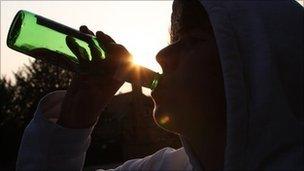MSPs say supermarkets 'undermining spirit' of alcohol laws
- Published
Supermarkets selling cheap alcohol have come in for criticism at a Scottish Parliament committee.
MSPs accused them of "undermining the spirit" of alcohol discounting laws by encouraging purchases online.
Legislation came into force last year banning volume sales of alcohol, with the aim of stopping "irresponsible promotions" such as two for one deals
However, loopholes in the law mean retailers are able to offer discounts on internet sales made in England.
Members of Holyrood's health committee raised the issue with representatives from Asda and Tesco during a session on the Scottish government's proposals for minimum alcohol pricing.
SNP MSP Jim Eadie asked: "Do you accept that there are many people who feel that you are not abiding by the spirit of the legislation that was introduced by the Parliament?
"The one thing that you did almost immediately when certain promotions were banned was to introduce bottles of wine for £3.33."
Mr Eadie said the supermarkets had been accused of "undermining the spirit of the legislation" by "slashing prices and encouraging online purchasing".
He continued: "It does leave the impression with the wider health community in Scotland who are widely focused on what is the biggest public health challenge facing this country, that your companies are putting their profits before the health of the people of Scotland."
David Paterson, head of regional affairs at Asda, replied: "The clear intention of the quantity discount ban was to reduce any incentive for a customer to buy a larger amount of alcohol than they had intended to.
"That was the clear and unequivocal objective.
"We made it very clear particularly in the last Alcohol Bill that when you intervene in a market which is part of a wider UK single market, there are a number of unintended consequences and they cannot be wished away.

The country's alcohol problems cost £3.56bn each year, says the government
"So, in the same sense that I have seen attacks on other retailers about the use of online, it seems a bizarre situation to me that there are companies based solely in England that can continue to sell alcohol at whatever price they want but that in some sense companies that are in Scotland and invest here shouldn't also be able to do that. There has to be a level playing field."
He added: "I think it's worth saying that we didn't slash our prices and we haven't driven customers online. We don't have an online alcohol offering."
Labour MSP Richard Simpson continued to press the supermarkets on the issue.
He said: "We may not have written the legislation correctly and I am not saying you are incorrect in terms of the law. I think we failed to understand fully when we passed that bill that it would not end volume discounting.
"The spirit of the law was quite clear, that we wanted to ban discounting for volume, and yet the supermarkets particularly - and also the small stores - are still selling on a volume discounting basis."
Mr Simpson asked the supermarkets how they would respond to minimum pricing.
Cross-border sales
Emma Reynolds, government affairs director for Tesco, said: "In a competitive market, if you do want action on price, it needs to be government-led and through legislation because we are in the business of competing for the best possible offers for customers.
"That is why we have said we'll be constructive in government-led discussions on price."
The session also took evidence from a number of other representatives from the drinks industry including the Scotch Whisky Association, Diageo, Tennent Caledonian Breweries (UK) Limited, the National Association of Cider Makers, the Scottish Beer and Pub Association and the Scottish Licensed Trade Association.
During the discussion there were also warnings about the possible consequences of introducing minimum pricing, such as cross-border sales, the impact on on-sales, and how supermarkets would sell on alcohol wastage.
The government's Alcohol Bill, external is set to become law before next summer.
A unit figure will be suggested after research by the University of Sheffield, which is re-running its minimum price modelling to produce the most up-to-date data.
The Scottish government has estimated that the country's alcohol problems cost £3.56bn each year - or £900 for every adult.
- Published1 November 2011
- Published1 November 2011
- Published1 November 2011
- Published21 October 2011
- Published1 October 2011
- Published30 September 2011
- Published10 November 2010